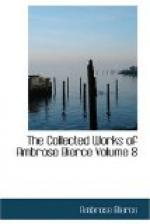What a ridiculous question you ask me. My poor partner, you don’t seem to know very much about the ice business.
PERRY CHUMLY’S ECLIPSE
The spectroscope is a singularly beautiful and delicate instrument, consisting, essentially, of a prism of glass, which, decomposing the light of any heavenly body to which the instrument is directed, presents a spectrum, or long bar of color. Crossing this are narrow, dark and bright lines produced by the gases of metals in combustion, whereby the celestial orb’s light is generated. From these dark and bright lines, therefore, we ascertain all that is worth knowing about the composition of the sun and stars.
Now Ben had made some striking discoveries in spectroscopic analysis at his private garden observatory, and had also an instrument of superior power and capacity, invented, or at least much improved, by himself; and this instrument it was that he and I were arranging for an examination of the comet then flaming in the heavens. William sat by apparently uninterested. Finally we had our arrangements for an observation completed, and Ben said: “Now turn her on.”
“That reminds me,” said William, “of a little story about Perry Chumly, who—”
“For the sake of science, William,” I interrupted, laying a hand on his arm, “I must beg you not to relate it. The comet will in a few minutes be behind the roof of yonder lodging house. We really have no time for the story.”
“No,” said Ben, “time presses; and, anyhow, I’ve heard it before.”
“This Perry Chumly,” resumed William, “believed himself a born astronomer, and always kept a bit of smoked glass. He was particularly great on solar eclipses. I have known him to sit up all night looking out for one.”
Ben had now got the spectroscope trained skyward to suit him, and in order to exclude all irrelevant light had let down the window-blind on the tube of it. The spectrum of the comet came out beautifully—a long bar of color crossed with a lovely ruling of thin dark and bright lines, the sight of which elicited from us an exclamation of satisfaction.
“One day,” continued William from his seat at another window, “some one told Perry Chumly there would be an eclipse of the sun that afternoon at three o’clock. Now Perry had recently read a story about some men who in exploring a deep canon in the mountains had looked up from the bottom and seen the stars shining at midday. It occurred to him that this knowledge might be so utilized as to give him a fine view of the eclipse, and enable him at the same time to see what the stars would appear to think about it.”
“This,” said Ben, pointing to one of the dark lines in the cometic spectrum, “this is produced by the vapor of carbon in the nucleus of the heavenly visitant. You will observe that it differs but slightly from the lines that come of volatilized iron. Examined with this magnifying glass”—adjusting that instrument to his eye—“it will probably show—by Jove!” he ejaculated, after a nearer view, “it isn’t carbon at all. It is MEAT!”




